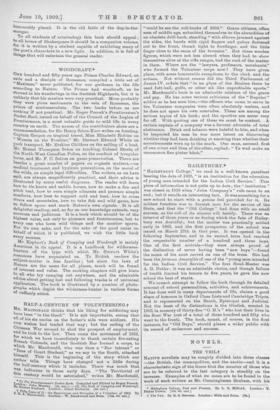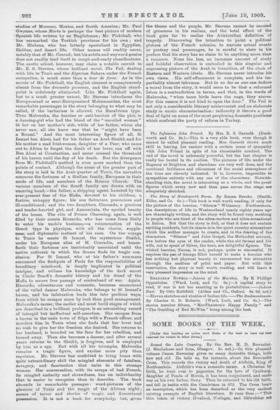NOVELS.
THE VEIL.t NATIVE novelists may be roughly divided into three classes —the British, the cosmopolitan, and the exotic—and it is a characteristic sign of the times that the number of those who are to be referred to the last category is steadily on the increase. Examples of what we mean are to be found in the work of such writers as Mr. Cunningham° Graham, with his
• Haileyburg College, Past and Present. By L. S. Milford. Londou t T. Pusher Unwlu. [10s. 6d. net.] t The Veil. By E. S. Stevens. London t Mills and Boon. [es.]
studies of Morocco, Mexico, and South America ; Mr. Paul Gwynne, whose Marta is perhaps the best picture of modern Spanish life written by an Englishman ; Mr. Pickthall, who has earmarked the Turkish provinces for his own ; and Mr. Hichens, who has latterly specialised in Egyptian, Sicilian, and desert life. Other names will readily occur, notably that of Mr. Conrad ; but his subtle and wayward genius does not readily lend itself to rough-and-ready classifications. The, exotic school, however, may claim a notable recruit in
• Mr. E. S. Stevens, whose brilliant novel, The Veil, dealing with life in Tunis and the Algerian Sahara under the French occupation, is much more than a tour de force. As in the novels of Mr. Pickthall, the English element is conspicuously absent from the dramatis personae, and the English stand- point is sedulously eliminated. Like Mr. Pickthall again, but to a much greater extent, Mr. Stevens introduces the Europeanised or semi-Europeanised Mohammedan, the most remarkable personages in the story belonging to what may be called, if the barbarism is allowed, the Eurafrican type. Thus Mabrouka, the heroine or anti-heroine of the plot, is a dancing-girl who had the blood of the "unveiled woman" in her on her mother's side, while of her father, whom she never saw, all she knew was that he " might have been a Roumi." And the most interesting figure of all, Si Ismael ben Aloui, had for his father an Arab Sheikh and for his mother a mad Irishwoman, daughter of a Peer, who came out to Africa to forget the death of her lover, ran off with Ben Aloui at Constantine, and never crossed the threshold of his harem until the day of his death. But the divergence from Mr. Piekthall's method is even more marked than the points of contact. Although the scene of the greater part of the story is laid in the Arab quarter of Tunis, the narrative concerns the fortunes of a Sicilian family, European in their mode of life, and members of the Roman Church. The various members of the Soarfi family are drawn with an unerring hand,—the father, a shipping agent, haunted by the ever-present fear of the Mafia, devoted to his children, a furtive, unhappy figure; his son Salvatore, precocious and Ill-conditioned; and the two daughters, Gioconda, a gracious and tender-hearted girl, and Annunziata, the spoiled beauty of the house. The role of Prince Charming, again, is well filled by their cousin Riccardo, who has come from Sicily to enter his uncle's business,—a reincarnation of the Greek type in physique, with all the charm, supple- kegs, and diplomatic instinct of his race. On the voyage to Tunis he meets Si Ismael, the mysterious Sheikh, under his European alias of M. Conradin, and hence- forth their fortunes are inextricably associated until the native outbreak in which the drama finds its tragic con- clusion. For Si Ismael, who at his father's summons renounced the fleshpots of Paris for the responsibilities of hereditary sainthood, is deeply implicated in • 1oliticts1 intrigue, and utilises his knowledge of the dark secret in Ciccio Scull's domestic history and his dread of the Mafia to secure free passage of contraband of war. Again, Riccardo, adventurous and romantic, becomes enamoured of the veiled dancer Mabrouka, who belongs to Si Ismael's harem, and his infatuation leads him into perilous ways, from which he escapes more by luck than good management. Mabrouka's career, the earlier and most lurid stages of which are described in a brilliant prologue, is an astonishing record of intrepid but ineffectual self-assertion. She escapes from a harem in the oasis town of Silga with a French officer, and murders hies in Tunis when else finds that her lover had no wish to give her the freedom she desired. She returns to her husband, is branded on the face for her rebellion, and turned away. Then she becomes a dancer, and after several years returns to the Sheikh, is forgiven, and is employed by bins as a spy. But with all her triumphs, Mabrouka remains a tragic figure, and excites more pity than repulsion. Mr. Stevens has contrived to bring home with quite extraordinary skill the mingled elements of fatalism, savagery, and fascination that unite in this strange woman. Her conversation, with its scraps of bad French, its mingled audacity and shrewdness, has an individuality that is easier to recognise than to describe. The book abounds in remarkable passages : word-pictures of the glamour of Tunis and the magic of the African night ; scenes • of terror and stories of Illogic and demoniacal possession. It. is not a hook for everybody, hut, .given the theme and the people, Mr. Stevens cannot be accused of grossness in his realism, and the total effect of the hook goes far 'to realise the Aristotelian definition of tragedy. Disavowing the intention to paint a political picture of the French colonies, to narrate actual events or portray real personages, he is careful to state in his preface that his story has no claim to be anything more.than a romance. None the less, an immense amount of study and faithful observation is embodied in this singular and engrossing picture of the Arab in transition, of the clash of Eastern and Western ideals. Mr. Stevens never, intrudes his own views. His self-effacement is complete, and his im- partiality almost inhuman. • But in so far as one can deduce a moral from the story, it would seem to be that a reformed Islam is a contradiction in terms, and that, in the words of Mabrouka, " when tame birds leave the cage, they starve. For this reason it is not kind to open the door." The Veil is not only a considerable literary achievement and an elaborate study in exotic oharaoterisation: indirectly it throws a good deal of light on some of the most perplexing domestic problems which confront the party of reform in Turkey.











































 Previous page
Previous page